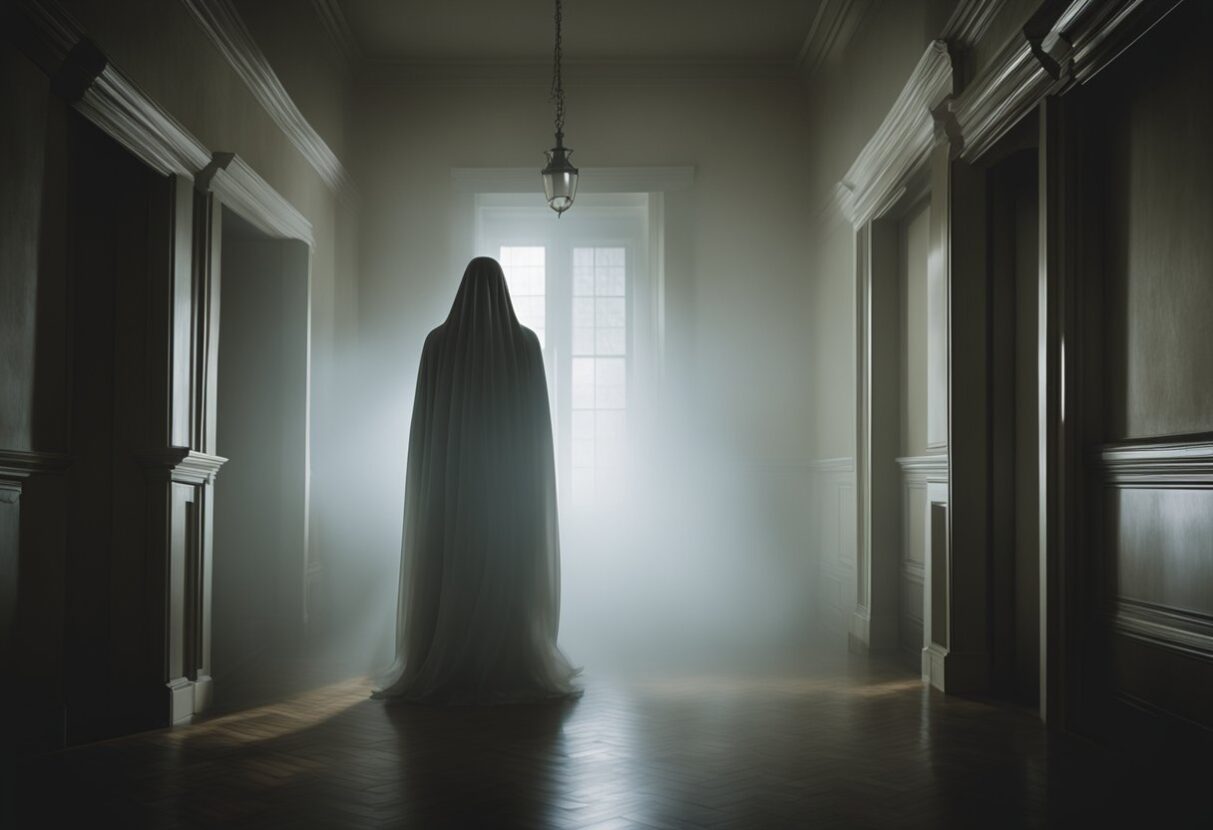Dreaming About Ghosts: Meanings And Interpretations
Understanding Dreams About Ghosts
Dreams about ghosts can be unsettling and confusing, often leaving you with unanswered questions and a sense of unease. However, these dreams are not necessarily a cause for alarm. In fact, they can offer valuable insights into your subconscious mind, highlighting fears, anxieties, and unexplored aspects of your identity.
From a psychological perspective, dreams about ghosts can be seen as a warning sign, alerting you to potential problems or emotional issues that you may be facing in your waking life. These dreams can also be a reflection of your conscience, highlighting areas of your life where you may be feeling guilty or uncertain.
From a spiritual perspective, dreams about ghosts can be interpreted as a connection to the spirit world. In some cultures, ghosts are seen as messengers, bringing messages from the other side. In others, they are seen as a symbol of change, representing the need for transformation and growth.
When interpreting dreams about ghosts, it is important to consider the specific scenarios and symbols that appear in the dream. For example, if you dream about a ghost that is chasing you, this may be a sign of anxiety or stress in your waking life. Alternatively, if you dream about a friendly ghost, this may represent a positive change or a new opportunity.
It is also important to consider your emotional response to the dream. Were you frightened, confused, or intrigued? Understanding your emotional reaction can provide valuable clues about the meaning of the dream.
In some cases, dreams about ghosts can be linked to sleep paralysis, a condition where you are unable to move or speak while falling asleep or waking up. This can create a sense of fear and panic, leading to vivid and unsettling dreams.
Overall, dreams about ghosts can be a powerful tool for self-discovery and personal growth. By exploring the symbolism and meaning behind these dreams, you can gain a deeper understanding of your subconscious mind and the emotional issues that may be affecting your life.
Common Themes in Ghost Dreams
Dreaming about ghosts can be a haunting and overwhelming experience for many people. Ghosts can appear in many different forms and contexts, and their presence in dreams can be interpreted in a variety of ways.
Encounters with Ghosts
One of the most common themes in ghost dreams is encountering a ghost. This can take many different forms, from seeing a ghost in your bedroom to encountering a ghostly figure in a deserted forest. These encounters can be frightening and unsettling, and they may leave you feeling vulnerable and exposed.
Haunted by the Past
Many ghost dreams are also characterised by a sense of being haunted by the past. Memories, regrets, and unresolved issues can all resurface in dreams, leaving you feeling overwhelmed and haunted by your past mistakes.
Symbolic Interpretations
Ghost dreams can also be interpreted symbolically, representing deeper psychological or spiritual issues. For example, ghosts may represent fears, insecurities, or desires that you are struggling to confront in your waking life.
Facing Fears and Anxieties
Dreams about ghosts can also be a way of facing fears and anxieties. By confronting your fears in a dream, you may be better equipped to deal with them in your waking life.
Spiritual and Supernatural Aspects
For some people, ghost dreams may have spiritual or supernatural significance. They may be interpreted as messages from the spirit world or as encounters with the afterlife.
Processing Emotions and Experiences
Finally, ghost dreams can also be a way of processing emotions and experiences. They may be a way of working through past traumas, processing difficult emotions, or coming to terms with loss and grief.
Overall, ghost dreams can be complex and multifaceted, and their interpretation can vary widely depending on the individual and their personal experiences. By exploring the different themes and contexts of ghost dreams, however, it is possible to gain a deeper understanding of their meaning and significance.
Interpreting Specific Dream Scenarios

Dreams about ghosts can be unsettling and even terrifying. However, they can also provide valuable insights into your subconscious mind. Here are some common dream scenarios involving ghosts and their possible interpretations.
Being Chased or Attacked by Ghosts
If you dream about a ghost attacking you or chasing you, it could represent your feelings of being threatened or overwhelmed by negative emotions in your waking life. You may be experiencing stress or anxiety about a particular situation or person. Alternatively, it could indicate that you are being haunted by unresolved issues from your past that need to be addressed.
Communicating with Ghosts
If you dream about communicating with a ghost, it could be a sign that you need to reach out to someone in your waking life. Perhaps you have unresolved matters with a loved one who has passed on, or you need to express your feelings to someone who is still alive. Alternatively, it could represent a desire for self-reflection and introspection.
Becoming a Ghost
If you dream about becoming a ghost yourself, it could indicate a fear of loss or a desire for control. You may be struggling with your identity or feeling like you are losing control over your life. Alternatively, it could represent a need for closure or a desire to resolve unresolved issues from your past.
Exorcising Ghosts
If you dream about exorcising a ghost, it could be a sign that you are taking control of a situation that has been causing you stress or anxiety. You may be confronting your fears or taking steps to address unresolved issues from your past. Alternatively, it could represent a desire to rid yourself of negative emotions or to gain closure on a particular situation.
Dreams about ghosts can be complex and multifaceted, and their interpretations can vary depending on the individual. However, by paying attention to the specific details of your dream and considering the possible meanings behind them, you can gain valuable insights into your subconscious mind and your waking life.
Cultural and Historical Perspectives on Ghosts

Ghosts have been a part of human culture for thousands of years. The belief in spirits and the supernatural is a cornerstone of many spiritual and religious traditions around the world. In many cultures, ghosts are seen as a manifestation of the dead, and their presence is believed to hold great significance.
From a spiritual perspective, ghosts are often seen as a reminder of the interconnectedness of all things. They may represent the continuation of life after death, or the presence of ancestors and loved ones who have passed away. In some cultures, ghosts are seen as protectors or guides, offering wisdom and guidance to the living.
Cultural views on ghosts have evolved over time, with different societies and traditions developing their own unique beliefs and practices. In ancient Egypt, for example, the dead were believed to have the power to influence the living, and elaborate rituals were developed to honour and appease them. In Japan, ghosts are often depicted as vengeful spirits seeking revenge for past wrongs.
In Western culture, ghosts have been a popular subject of literature and folklore for centuries. From Shakespeare’s Hamlet to Charles Dickens’ A Christmas Carol, ghosts have been used to explore themes of morality, redemption, and the afterlife. In the early modern period, ghost stories were a common form of entertainment, with many people believing in their veracity.
Today, the belief in ghosts and the supernatural continues to be a part of many people’s lives. While some dismiss it as superstition, others find comfort and meaning in the idea of an afterlife and the continued presence of loved ones who have passed away. Whether you believe in ghosts or not, they remain a fascinating and enduring part of human culture.
Practical Steps for Dealing with Disturbing Dreams

Dreams about ghosts can be unsettling and leave you feeling anxious or afraid. While these dreams can be a reflection of your subconscious fears and emotions, they can also be a sign of stress or other underlying problems. Here are some practical steps you can take to deal with disturbing dreams:
1. Identify the Source of Your Stress
Stress and anxiety can often be the cause of disturbing dreams. If you are experiencing high levels of stress in your waking life, it may be helpful to identify the source of your stress and work on reducing it. This may involve making lifestyle changes, such as getting more exercise or practicing relaxation techniques like meditation or yoga.
2. Practice Self-Reflection
Dreams about ghosts can also be a sign of unresolved emotions or problems. Take some time to reflect on what might be causing these feelings and try to address them. This may involve talking to a therapist or loved one, journaling, or practicing mindfulness.
3. Interpret Your Dreams
Dream interpretation can be a helpful tool in understanding the meaning behind your dreams. Consider the symbolism of the ghosts in your dream and what they might represent. For example, ghosts may represent negative emotions like guilt or regret, or they may be a sign that you need closure on a past event.
4. Seek Closure
If your dreams about ghosts are related to a past event, seeking closure may be helpful in reducing their frequency. This may involve confronting the person or situation that is causing you distress, or finding ways to let go of the past and move on.
By taking practical steps to address the underlying causes of your disturbing dreams, you can reduce their frequency and find peace of mind. Remember that it’s normal to have unsettling dreams from time to time, but if they are causing you significant distress, it may be helpful to seek support from a mental health professional.
When to Seek Professional Help

Dreams about ghosts can be unsettling and may leave you feeling overwhelmed or anxious. If you find yourself experiencing emotional issues or trauma related to your ghost dream, it may be time to seek professional assistance.
Speaking with a therapist or dream analyst can provide invaluable support and guidance in unraveling the symbolism and significance of your dream. They can help you explore any unresolved issues, fears, or regrets that may be contributing to your recurring ghost dreams.
Professional help can also be beneficial if you are experiencing overwhelming stress or anxiety related to your ghost dream. A therapist can help you develop coping mechanisms and strategies to manage your emotions and reduce anxiety.
If you feel guilty or ashamed about your ghost dream, know that seeking professional help is a sign of strength, not weakness. A therapist can help you work through any feelings of guilt or shame and develop a healthier relationship with your dreams.
Remember, dreams are deeply personal and can be influenced by a variety of factors, including your personal experiences, cultural beliefs, and psychological state. Seeking professional help can help you gain a deeper understanding of your dreams and develop a more positive relationship with them.
If you are struggling with recurring ghost dreams or any other type of dream, don’t hesitate to reach out for professional assistance. With the help of a therapist or dream analyst, you can gain insight into the hidden messages and insights that your dreams hold.
Exploring Personal Beliefs and Feelings
When it comes to interpreting dreams about ghosts, personal beliefs and feelings can play a significant role. Your beliefs about death, the afterlife, and the supernatural can influence how you interpret these dreams. For instance, if you believe in the existence of ghosts, you may interpret a dream about a ghost as a sign of communication from beyond the grave. On the other hand, if you do not believe in ghosts, you may interpret the same dream as a manifestation of your subconscious fears or emotions.
Emotions such as fear, guilt, regrets, and desires can also influence how you interpret dreams about ghosts. For example, if you are feeling guilty about something, you may dream of a ghost as a symbol of your guilty conscience. Similarly, if you are feeling regretful about a past decision, you may dream of a ghost as a reminder of your past actions.
Your self-esteem and identity can also play a role in how you interpret dreams about ghosts. If you are feeling insecure about yourself or your place in the world, you may dream of a ghost as a symbol of your own mortality or insignificance. Alternatively, if you have a strong sense of self and identity, you may interpret a dream about a ghost as a symbol of your own resilience and strength.
In addition to personal beliefs and emotions, sentimental and cultural factors can also influence how you interpret dreams about ghosts. For example, if you have a sentimental attachment to a deceased loved one, you may dream of a ghost as a way of connecting with that person. Similarly, if you come from a culture that places a strong emphasis on the afterlife or spiritual beliefs, you may interpret dreams about ghosts differently than someone from a culture that does not.
Overall, interpreting dreams about ghosts can be a complex and highly personal process. By exploring your own beliefs, emotions, and cultural background, you can gain a deeper understanding of what these dreams may mean for you.
Dreams About Ghosts in Popular Culture
Dreams about ghosts have been a common theme in popular culture for centuries. From classic literature to modern-day movies and TV shows, ghosts have played a significant role in shaping our public perception of these supernatural beings. Ghosts in media have influenced our dreams and have become a part of our collective consciousness.
In literature, ghosts have been used as a literary device to convey a wide range of emotions and ideas. For example, in Charles Dickens’ “A Christmas Carol,” the ghost of Jacob Marley appears to Ebenezer Scrooge to warn him of his impending fate. The ghost of Marley is a symbol of Scrooge’s past mistakes and the consequences of his actions. In this way, ghosts are often used to represent unresolved issues and unfinished business.
In film and television, ghosts are often portrayed as malevolent beings who seek revenge or haunt the living. However, there are also examples of friendly and helpful ghosts, such as Casper the Friendly Ghost. The portrayal of ghosts in media has a significant influence on our dreams and our perception of these supernatural entities.
Dreams about ghosts are often interpreted as a symbol of unresolved emotions or fears. According to some psychological theories, dreams about ghosts could be a manifestation of our subconscious fears and anxieties. Dreams about ghosts can also be interpreted as a sign of unfinished business or unresolved issues from our past.
In conclusion, dreams about ghosts have played a significant role in shaping our public perception of these supernatural entities. The portrayal of ghosts in popular culture has influenced our dreams and has become a part of our collective consciousness. Dreams about ghosts are often interpreted as a symbol of unresolved emotions or fears, and they can provide valuable insights into our subconscious mind.
Advancements in Dream Research and Analysis
Dreams have fascinated humans for centuries, and research into dreams has been ongoing for over a century. Scientific studies have helped us understand the subconscious mind and the role it plays in dreaming. Dream interpretation has evolved significantly over the years, and many methods have been developed to analyse and understand dreams.
One of the most significant advancements in dream research is the use of neuroscience to study dreams. Researchers have found that the brain is highly active during REM sleep, the stage of sleep when most dreaming occurs. This has led to the belief that dreams are a product of the brain’s activity during this stage of sleep.
Structural Dream Analysis (SDA) is a research method that focuses on the relationship between the dream ego and other figures in the dream and the extent of activity of the dream ego. Research with this approach has produced new insights on the connections of dreams to waking life. SDA has been used to reanalyze Freud’s interpretation of dreams, leading to new insights into the function and meaning of dreams.
Dream research has also explored the cultural and historical context of dreaming. Dreams have played a significant role in many cultures and spiritual beliefs. For example, in Chinese culture, dreams are believed to be a way to communicate with ancestors, while in Native American culture, dreams are seen as a way to connect with the spirit world. Exploring these diverse cultural perspectives can provide insight into the meaning and symbolism of dreams.
In conclusion, advancements in dream research and analysis have led to a greater understanding of the role of dreams in our lives. By using scientific methods, exploring cultural and historical contexts, and developing new techniques for dream interpretation, researchers are uncovering the mysteries of the subconscious mind and the symbolism of dreams.
Conclusion: Embracing the Mystery of Dreams
Dreams are a fascinating and mysterious aspect of our lives. While many people find them unsettling or confusing, there is no denying that they offer a unique window into our subconscious minds. Despite the uncertainty and mystery that surrounds dreams, it is important to accept them as a natural part of our lives and embrace their potential for self-discovery and personal growth.
One of the most important aspects of understanding dreams is accepting the uncertainty that comes with them. Dreams are often full of symbolism and hidden meanings that can be difficult to decipher. However, by embracing the mystery of dreams, we can begin to explore the deeper aspects of our subconscious minds and gain a greater understanding of ourselves.
Dreams offer a unique opportunity for self-discovery and personal growth. By exploring our dreams and the symbolism they contain, we can gain insights into our fears, desires, and emotions. This can help us to better understand ourselves and our place in the world, as well as identify areas for personal growth and development.
While dreams can be confusing and even frightening at times, it is important to remember that they are a natural and important part of our lives. By embracing the mystery of dreams and exploring their potential for self-discovery and personal growth, we can gain a deeper understanding of ourselves and the world around us.







